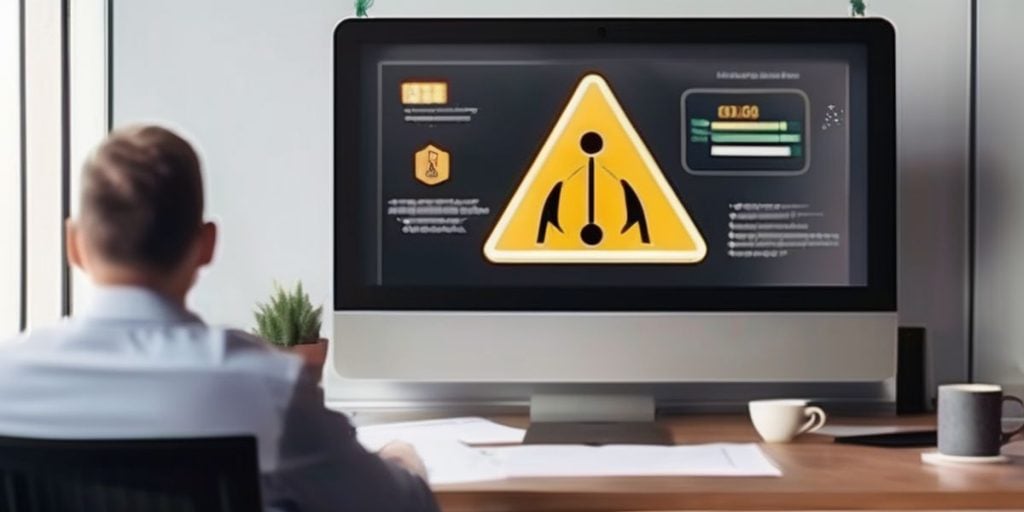The rise of remote work has opened a new realm of job opportunities, but it’s crucial to approach these prospects with caution. As the search for the perfect remote position unfolds, it’s important to be vigilant and discerning to avoid pitfalls such as scams or unsatisfactory work conditions. This article will guide you through the red flags to watch out for during your remote job hunt, ensuring that you embark on a professional journey that’s both legitimate and fulfilling.
Key Takeaways for Avoiding Red Flags in Remote Job Opportunities
A vague job description can indicate a lack of clarity and direction within the company, leading to potential frustration and misalignment of expectations.
Unprofessional communication, such as poor email etiquette or a weak online presence, often reflects the overall company culture and approach to remote work.
Be wary of issues during contract negotiations, like changing terms last minute, as they can signal a lack of respect for agreements and potential future disputes.
Inadequate remote work support, including insufficient technology resources or policies, can hinder productivity and job satisfaction in a remote environment.
A suspicious company reputation, underscored by negative employee reviews or an absence of verifiable information, may point to underlying issues within the organization.
Vague Job Descriptions

When you’re on the hunt for a remote position, clarity is key. A job description should serve as a roadmap, guiding you to understand exactly what is expected of you. However, if you encounter a job listing that leaves you with more questions than answers, consider it a red flag. Here’s what to watch out for:
Lack of Role Clarity
A precise job title and a list of well-defined responsibilities are non-negotiables. If the role seems to morph with every conversation, or if the title is ambiguous, such as ‘Sales Rockstar’ or ‘Marketing Guru’, proceed with caution. You should know exactly what you’re signing up for.
Inconsistent Responsibilities
Inconsistencies in the job description can be a sign of disorganization or a lack of understanding of the role within the company. If the listed tasks vary significantly from one source to another, it’s time to ask for clarification.
Missing Information
A complete job description includes details about the company, the team you’ll be working with, and the specific skills required. If these pieces are missing, it’s possible that the job isn’t well-defined—or worse, it doesn’t actually exist. Always verify the legitimacy of the job by seeking out additional information.
Remember, a vague job description not only hampers your ability to assess the role but also reflects on the company’s professionalism. If you’re left guessing about the day-to-day tasks or the company’s expectations, you might want to reconsider your application.
Unprofessional Communication

When you’re interviewing for a remote position, pay close attention to how the company communicates with you. Professional communication is a cornerstone of a successful remote work environment. If you encounter any of the following red flags, it may be time to reconsider your application:
Poor Email Etiquette
Emails riddled with typos or grammatical errors
Lack of clear and concise information
Failure to address you by name or use a generic greeting
If you find that sloppy communication is a recurring theme, it could reflect the company’s overall approach to work.
Weak Online Presence
Absence of a professional website or social media profiles
Incomplete or outdated LinkedIn company page
No verifiable contact information
Delayed Responses
Consistent failure to respond to your follow-ups
Long periods of silence after interviews
No acknowledgment of received communications
Remember, during the interview process, being perceived as unprofessional can significantly impact your chances. If you notice disrespectful comments, disorganization, or a lack of courtesy, it could indicate a toxic workplace culture. Always ensure that the company exhibits a level of professionalism that matches your expectations for a remote role.
Issues During Contract Negotiations

When you’re in the midst of contract negotiations for a remote position, pay close attention to the details. Changing Terms Last Minute can be a significant warning sign. It’s not uncommon for some companies to alter the deliverables or the timeframe just before signing, which can undermine the initial agreement and leave you in a precarious position. Here’s what to look out for:
Lack of Transparency
A company that is not transparent about the work and the expected timeframe is a recipe for chaos. If the goalposts keep moving, you’ll struggle to understand your deliverables and to gauge your performance. This lack of clarity is a red flag that shouldn’t be ignored.
Unclear Contractual Obligations
Ensure that your contractual obligations are spelled out clearly. Ambiguity here can lead to disputes and dissatisfaction. If you find yourself on platforms like Fiverr or Upwork, unclear terms can result in negative reviews and damage your reputation.
Changing Terms Last Minute
Be wary if the terms of your contract change unexpectedly. This can indicate a lack of organization or even bad faith on the part of the employer. Always triple-check and communicate to ensure that both parties have a mutual understanding of the responsibilities.
Remember, negotiation is a standard part of the job offer process. An employer’s unwillingness to negotiate on salary, benefits, or flexibility is a red flag that may suggest they don’t value your worth or have a rigid work culture.
Inadequate Remote Work Support

Insufficient Technology Resources
When you’re interviewing for a remote position, it’s crucial to ensure that the company provides the necessary technology resources. Ask about the tools and software you’ll be expected to use and whether the company offers support for technical issues. A lack of proper resources can hinder your productivity and job satisfaction.
Company-provided equipment
Access to necessary software
IT support availability
Lack of Remote Work Policy
A clear remote work policy is essential for setting expectations and boundaries. Without it, you may face confusion regarding work hours, communication protocols, and performance metrics. Inquire about the company’s remote work policy to understand how they manage their remote workforce.
Defined work hours
Communication guidelines
Performance evaluation criteria
No Mention of Work-Life Balance
Work-life balance is particularly important in remote roles, where the lines between personal and professional life can blur. If the company doesn’t mention work-life balance or seems to dismiss its importance, consider this a red flag. A healthy remote work environment should support your well-being and personal time.
-
Importance of breaks
-
Encouragement of time off
-
Respect for personal boundaries
It’s essential to ask direct questions during your interview to gauge the company’s support for remote work. A straightforward question like, “Do you support remote work?” should elicit a clear response that will reveal the company’s stance.
Suspicious Company Reputation

When you’re exploring remote positions, the company’s reputation can be a beacon guiding your decision. Be wary of negative employee reviews; they can be a telltale sign of underlying issues. A pattern of dissatisfaction among current or former employees, especially regarding management style or work-life balance, should not be ignored.
Lack of Verifiable Information
In the digital age, a legitimate company should have a traceable online footprint. If you’re struggling to find concrete information, consider this a red flag:
Search for the company on the Better Business Bureau (BBB).
Verify the physical address and phone number.
Look for an information page or at least a BBB rating.
No Employees on LinkedIn
A company’s workforce often reflects its legitimacy. An absence of employees on professional networks like LinkedIn could indicate a facade. Steps to take:
Check for employee profiles associated with the company.
Investigate the authenticity of the profiles.
Cross-reference with other social media platforms.
If the company’s online presence feels orchestrated rather than organic, trust your instincts and proceed with caution.
Remember, a reputable company will have clear hiring processes and a robust online presence. If you encounter a company with a suspicious reputation, it’s better to steer clear than to regret it later.
Inappropriate Interview Questions

Personal Over Professional
When you’re interviewing for a remote position, pay close attention to the focus of the questions. If the interviewer dwells on personal topics rather than your professional qualifications, it’s a red flag. Questions about your private life, such as marital status or family plans, are not only irrelevant but can also be illegal. This could reflect a company culture that lacks respect for personal boundaries.
Uncomfortable or Irrelevant Topics
During the interview process, you might encounter questions that make you feel uncomfortable or seem completely irrelevant to the job at hand. Trust your instincts; if something feels off, it probably is. An interview should be a professional exchange, and any deviation from this could be indicative of deeper issues within the company’s culture.
Pressure to Provide Private Information
Be wary if you’re asked to provide information that has no bearing on your job performance. This includes requests for social security numbers, financial details, or other sensitive data before a job offer is made. Such demands can signal a lack of ethical standards and may even suggest potential identity theft or scams.
Remember, you have the right to decline answering any question that you find inappropriate. Instead, steer the conversation back to your professional skills and how they align with the job requirements.
Misleading Remote Work Advantages

Overemphasis on Perks
When you’re interviewing for a remote position, be cautious of companies that overemphasize perks such as unlimited coffee or casual Fridays. While these benefits are nice, they should not overshadow the core aspects of the job. Look for a balance between perks and professional responsibilities.
Unlimited coffee
Casual Fridays
Free snacks
Undervaluing Professional Growth
A company that does not prioritize your professional growth can be a major red flag. Ensure that there are clear opportunities for advancement and skill development. Remote work should not mean career stagnation.
Opportunities for advancement
Skill development programs
Regular performance reviews
Ignoring Real Remote Work Challenges
Remote work comes with its own set of challenges, and a company that ignores these is not preparing you for success. Issues such as isolation, communication barriers, and time management should be openly discussed and addressed.
Isolation
Communication barriers
Time management
It’s essential to weigh the advantages against the potential challenges of remote work to ensure that you’re making an informed decision.
Red Flags in Job Advertisements

Posting in Unreliable Places
When you’re on the hunt for a remote position, the places where job ads are posted can tell you a lot about the legitimacy of the opportunity. Be wary of job listings on obscure or non-professional platforms; they may not be vetted and could lead you to scams or unprofessional entities. Stick to reputable job boards and company websites.
Fishy URLs and Contact Details
As you navigate through remote job advertisements, pay close attention to the URLs and contact details provided. If the URL seems odd or the contact email is a personal rather than a professional one, take it as a red flag. These details should align with the company’s official domain and professional standards.
Too Good to Be True Offers
Lastly, if an offer seems too good to be true, it probably is. Remote job scams often lure candidates with promises of high pay for little work. Always research the company and role thoroughly before proceeding.
Remember, your due diligence is your best defense against falling for a job scam. Trust your instincts and look for clear, professional communication throughout the job search process.
Conclusion
In conclusion, the allure of remote work is undeniable, but it’s crucial to approach job opportunities with a discerning eye. The red flags discussed in this article serve as a guide to help you navigate the remote job market safely. From unclear job descriptions to unprofessional communication, these warning signs are indicators that a job may not be what it seems. Remember to thoroughly research companies, scrutinize job postings, and trust your instincts. By doing so, you can avoid scams and find a remote position that is both legitimate and fulfilling. As you embark on your search, keep these red flags in mind and proceed with caution to secure a remote role that aligns with your professional goals and values.
Frequently Asked Questions
What should I be cautious of in a remote job description?
Be wary of vague job descriptions that lack role clarity, have inconsistent responsibilities, or are missing critical information about the position.
How can unprofessional communication be a red flag for remote jobs?
Unprofessional communication, such as poor email etiquette, a weak online presence, or delayed responses, can indicate a lack of organization and professionalism within the company.
What issues should alert me during remote job contract negotiations?
Be alert if there are last-minute changes to the terms, unclear contractual obligations, or a general lack of transparency during the negotiation process.
How important is remote work support from a potential employer?
Adequate remote work support is crucial. Look for companies that provide sufficient technology resources, have a clear remote work policy, and mention work-life balance.
What are signs of a suspicious company reputation when looking for a remote job?
A suspicious company reputation can be indicated by negative employee reviews, a lack of verifiable information, or an absence of employees on professional networking sites like LinkedIn.
What misleading advantages should I watch out for in remote job advertisements?
Be cautious of job ads that overemphasize perks, undervalue professional growth, or ignore the real challenges of remote work, as these can be misleading about the actual job experience.
